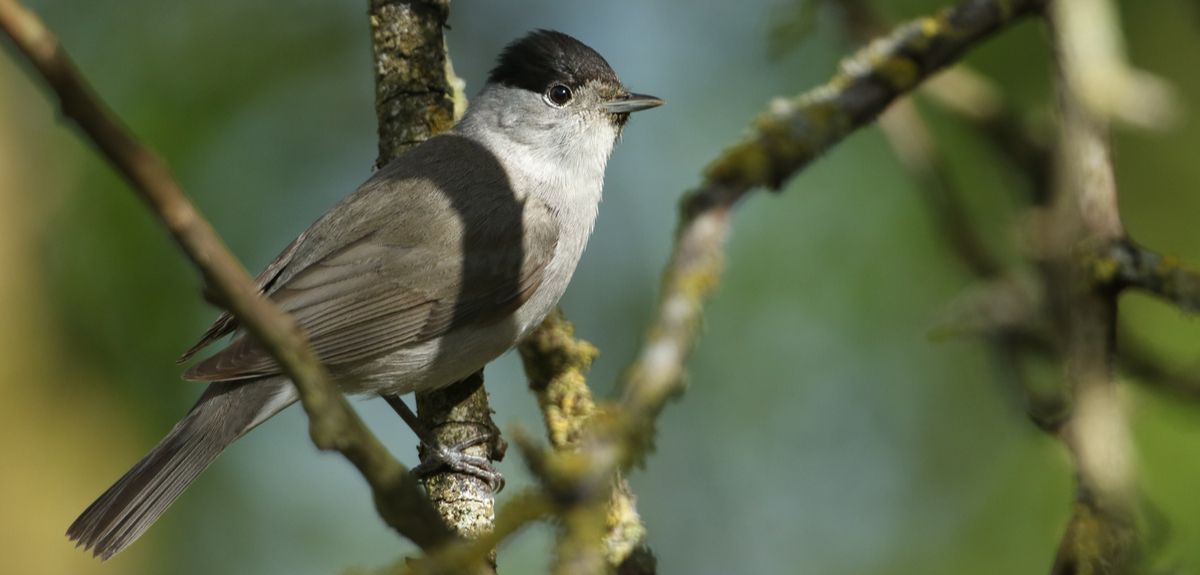
Bird feeders have reversed Blackcaps’ migration, with the fair weather visitors wintering in British and Irish gardens
Blackcaps typically visit Britain and Ireland during the spring and summer months to breed before migrating south to wintering areas in the Mediterranean. But, a study from Oxford University, the British Trust for Ornithology and the Max Planck Institute, has found the small warblers have expanded their wintering range northward across Europe and are now frequently found in Britain and Ireland in the winter months.
But, the study reveals, these birds are not breeders merely staying put. Instead, these wintering Blackcaps overwhelmingly originate from breeding locations across Europe, and are undertaking a highly atypical north-westward migration to our shores each autumn.
Benjamin Van Doren, who led the study as part of his doctoral research with Oxford's Department of Zoology, said, ‘We were surprised to find stark differences in the birds’ anatomy and physiology depending on how often they appeared in gardens. For example, adult Blackcaps which frequented gardens were able to carry smaller fat stores because they know where their next meal will come from. This reduced weight makes them more agile and likely better able to escape from predators.’
The provision of bird food in gardens during cold weather has not only contributed to evolutionary change in Blackcaps, in that large numbers now migrate to Britain and Ireland for the winter. But the behaviour of the birds once they are on their wintering grounds has modified
The results showed the extent to which Blackcap ecology is shaped by human activities. The provision of bird food in gardens during cold weather has not only contributed to evolutionary change in Blackcaps, in that large numbers now migrate to Britain and Ireland for the winter. But the behaviour of the birds once they are on their wintering grounds has modified.
Blackcaps wintering in the Mediterranean primarily eat fruit and move through the landscape looking for their next meal once their existing food supply has been depleted. By contrast, Blackcaps wintering in British and Irish gardens have a steady, predictable food supply. They move around less and are more faithful to particular wintering sites.
The study used data from colour-ringing. More than 600 individual birds had a unique combination of coloured rings fitted to their legs, which people can easily observe and report. A 32-bird sample was also tracked with geolocators – small devices that measure day length and the time of solar noon, and give more detailed information on birds’ movements than colour-ring sightings alone.
Greg Conway, Senior Research Ecologist at BTO and co-author of the study, said, ‘This study is a fantastic example of cooperation, where BTO volunteer Garden BirdWatchers and bird ringers provide the data that underpin robust scientific research into understanding the influence of human activity on this novel migratory behaviour.’
The researchers even found that gardens may be influencing Blackcap anatomy: those in gardens had longer bills and more rounded wingtips, which may be linked to their more generalist diet and sedentary winter lifestyle
It emerged that Britain- and Irish-wintering Blackcaps are able to fatten up fast before migrating back to their breeding grounds and make a speedy return journey (arriving back around 10 days earlier than their competitors) - another possible advantage of having predictable food at hand (or claw). The researchers even found that gardens may be influencing Blackcap anatomy: those in gardens had longer bills and more rounded wingtips, which may be linked to their more generalist diet and sedentary winter lifestyle.
At a time when so many species are struggling to adapt to human-mediated environmental change, Blackcap numbers are actually rising and this species’ ability to ring in the changes might explain why.
The birds were ringed and their movements monitored by a cohort of dedicated volunteer citizen scientists, many taking part in the Ringing Scheme and Garden BirdWatch, both of which are run by BTO.
 Statins do not cause the majority of side effects listed in package leaflets
Statins do not cause the majority of side effects listed in package leaflets